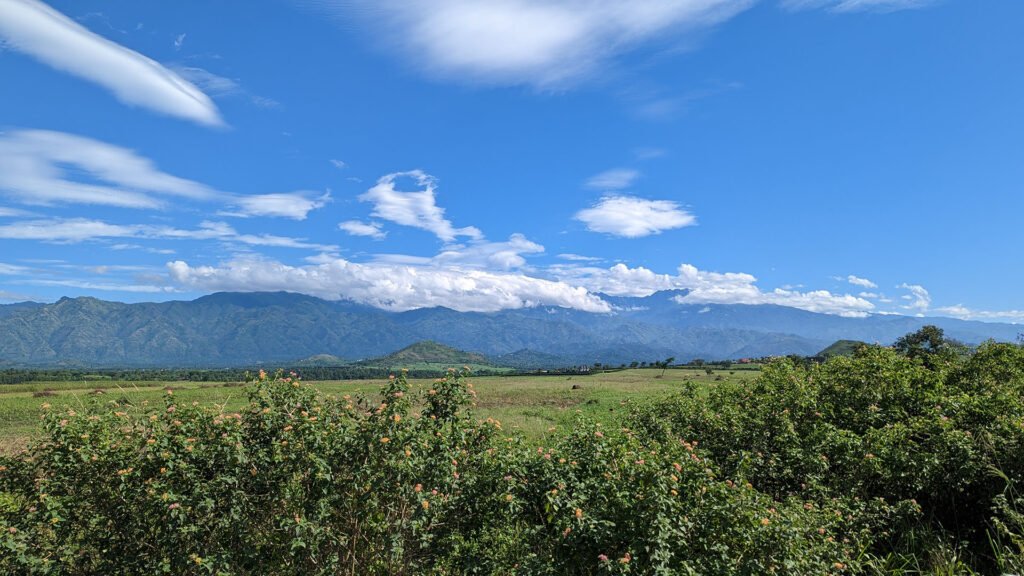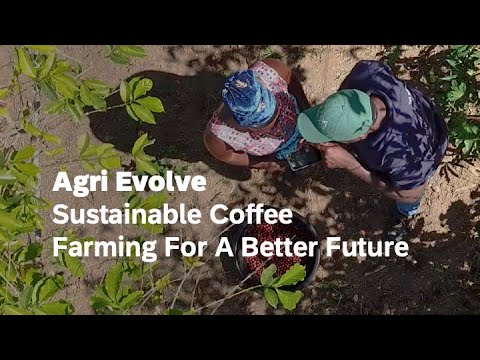More than 2.6 billion cups of coffee are consumed every day, lifting coffee to third place in the hit list of the world’s most-consumed beverages, after water and tea. But the ecosystem of coffee as we know it is changing. Environmental changes are influencing conditions in the producing countries and impacting the livelihoods of coffee farmers and their families. And – on the positive side – the demand for sustainably produced coffee is growing exponentially. These changing circumstances call for new solutions to adjust coffee supply chains accordingly.
Someone who seized this opportunity is Jonny Rowland. Having spent a big part of his childhood in Uganda, he saw the opportunity in the growing thirst for sustainable, high-quality coffee – and an opportunity to ensure that coffee farmers would receive their fair share in this business. Together with his sister Beth, he founded Agri Evolve Ltd., a profit-for-purpose business that works directly with local farmers to achieve higher yields and the high quality coffee that is sought after on the global market.
With the support of local experts working for Agri Evolve, farmers have improved their productivity and increased income for themselves, their families, and their communities. The main idea of this social enterprise is to use digital technology to improve established supply chains for coffee cherries in the Rwenzori Mountains, one of Uganda’s key habitats for Arabica coffee plants, and share the latest agricultural practices with local farmers.
A Long-Lasting Tradition: Coffee in Uganda
Uganda is one of the few countries in the world where coffee plants are native. The processed beans are an integral part of Uganda’s export economy, making the country one of the 10 largest coffee producers in the world. In recent years, Uganda has made a name for its specialty Arabica, which thrives in the local climate with humid days and cool nights. But Arabica coffee, a climate sensitive plant, is beginning to struggle as global warming shortens the cooler phases it needs to thrive. This requires adjusting the traditional ways of cultivating the cherries.
Over 1.8 million households in Uganda grow coffee, and coffee contributes nearly a third of the country’s export earnings, paying for critical infrastructure like roads, hospitals, and schools. While many families grow coffee, it was hard to make a living out of it in the past and motivation to produce high quality was low as prices on global markets wouldn’t justify the effort.
Joyce Birungi is one of the coffee farmers living high in the rainforest of the Rwenzori Mountains who registered with Agri Evolve as a supplier. Like most farmers in this remote area, she took care of the plants based on traditions passed down over generations. The cherries were often picked too early and only ripened while drying in the sun for longer periods, which caused a loss in quality and therefore lower prices. Climate changes, like increases in floods, droughts, and heat waves, put additional pressure on the traditional ways of farming.
“In the past, I used to pick coffee cherries of poor quality. So, I lost a lot of money,” Birungi said, explaining her challenges as a small local producer before working with Agri Evolve. “Transportation was a big challenge. I had no way of selling the coffee and I didn’t know about best practices in farming and agribusiness.”
Collins Kifula is a field coordinator at Agri Evolve and an expert for sustainability and quality. He works closely with the farmers, registering each farmer using a mobile app based on the SAP Rural Sourcing Management solution and collecting data like the size of the farm and the state of the coffee trees. Using the mobile app saves time – time he can use to talk to the farmers and solve issues they might be facing or suggest improvements to their current setup. One important focus of his work is education on soil protection. With floods happening more frequently these days, farmers benefit from terraces and planting grass patches to avoid the fertile soil being washed away by rain.
As Agri Evolve is specialized in high-quality, sustainable coffee, certification is required. “We need to hold up to a certain level of quality and we do that by getting, for example, the Rainforest Alliance Certification. To receive this, we need to raise data and have the transparency. Here, the mobile app within SAP Rural Sourcing Management is of huge help,” Kifula explained.
“Technology Is Changing Things”
The biggest challenges the farmers faced before starting to work with Agri Evolve was the quality of the cherries and the lack of price transparency. Sometimes there was even fraud along the process of collecting the cherries. “Technology is changing things,” Kifula said.
Today, farmers still deliver their cherries to so-called middlemen who check the quality, but they now document the weight using the SAP app. The farmers instantly receive an SMS message showing the delivered quantity and its value. “This price transparency is a big motivation for the farmers and creates trust,” he said. Further, SAP Rural Sourcing Management enables the calculation of the accrued delivery quantities and therefore the yield a farm is producing, which are used as the assessment basis to provide loans to the farmers.
Keeping Track of Data
“Our mission is to do sustainable farming for future generations. As a social enterprise, Agri Evolve works with a growing number of farmers, which can quickly add complexity to our supply chain. Today, we deal with around 22,000 smallholders. We collect a lot of data that needs to be analyzed,” Roset Biira, field supervisor at Agri Evolve, said. “We needed a system that collects and analyzes our data in an efficient way – to be able to be transparent to all our farmers and even our clients.” Using SAP Analytics Cloud, Biira showed how Agri Evolve can identify if coffee trees are getting old or are weakened by pests early on. Based on these predictions, they consult with the farmers on planting new trees or suggest trainings on pest control.
Realizing Change
Agri Evolve is building a network of trust with the farmers and middlemen, making sure to give the best price possible to the farmers so that the local societies participate in the higher prices sustainable coffee can generate on the global markets.
“I’m now able to increase my coffee production and send my kids to school, and I hope that they will graduate from university and have better lives. We used to live in semi-permanent houses, but now we are moving to permanent housing,” Birungi said when asked what impact this new way of collaboration has had on her and her family.
Talking about the future of the growing profit-for-purpose business and its network of local coffee producers, Beth Rowland, co-founder of Agri Evolve, said: “We will continue to push the boundaries of supply chain transparency through digitalization to allow us to provide the best service to smallholder farmers in the Rwenzoris.” For the family business, it is important to ensure connected farmers have access to a fair and transparent market for their coffee cherries.
While sharing sustainable practices to counteract the impact of environmental changes is a requirement for the production of certified sustainable coffee, it will also make sure that the tradition of coffee production will live on in the Rwenzori mountains of Uganda.

